Ritual for the Losses: A Brief Conversation with Jen Shyu
|
Getting your Trinity Audio player ready...
|
During her recording career thus far, Jen Shyu has drawn on a deep well of song, fable, and poetry from various Asian traditions. Often these incorporate each culture’s native languages. The music on Zero Grasses: Ritual for the Losses (Pi, 2021), her extraordinary new release similarly builds upon traditional Javanese music, Japanese katari, and East Timorese chant. But Zero Grasses is also different from Shyu’s other recordings. While she generally incorporates her own experiences in her works, this is perhaps her most personal to date. Using the language of her adolescent diaries allows her to reflect upon racism, sexism, climate change, and the passing of her father. The album is a daring and breathtaking gambit, even for an artist constantly seeking new challenges.
Zero Grasses is many things: song cycle, monodrama, liturgy, jazz set, séance, and confession. It could hardly be otherwise given Shyu’s almost impossibly long list of superpowers as a composer, vocalist, instrumentalist, dancer, dramaturg, linguist, actor, priestess, medium, and perhaps most accurately, griot. Those are all individual skills that Shyu has mastered to an extraordinary degree. She is the most singular of artists. Or, as Pi Recordings founder Seth Rosner has noted, “[w]e can’t think of anyone else like her.”
While her mastery of those disciplines has been rightly celebrated, she has received far less attention as the leader of an empathetic and flexible band that has accompanied her as she has journeyed to uncharted territory. PostGenre asked her about this aspect of her artistry as part of a longer conversation that, edited for length and clarity, was a personal tour through the expanding architecture of her artistry.
PostGenre: Your music over the past five years or so has featured many of the same artists. That amount of consistency is really notable these days. What inspired your choice in instrumentation? The use of trumpet and viola are particularly interesting as they are very voice-like instruments, very human, and expressive and emotive.
Jen Shyu: I’ve been playing with [drummer] Danny [Weiss] and [bassist] Thomas [Morgan] since a 55 Bar gig in either 2006 or 2007. That was very early on when Queva [Jayne Lutz, who owned 55 Bar] was still with us. That 55 Bar gig was really the origins of my Jade Tongue group and a focus on music that was based in language and not just my experiments with composing.
In 2008, I brought in Mat [Maneri] on viola. I started playing with Mat because I was taking some lessons from him at the time. He’s just one of the great improvisers of our generation–and so underrecognized. [His playing is] very abstract. Actually, I don’t know if his playing always registers with people because it is so abstract. But it’s brilliant. And so, I asked him to play on my work Cry of the Nomad. Though I never recorded the music for that project, it was one of my first ventures into adding theater into my work. He played on that, and on every project since, I wanted him there.
And then there is [trumpeter] Ambrose [Akinmusire]. The first recording he did with me was “The Sounds and Cries of the World” in 2015. But he played with me at some 55 Bar gig as well, maybe in 2014 or 2013. I met him in New York, and I think Ambrose and I rode the subway together after something we saw at the old Jazz Gallery on Hudson Street. We started a conversation and it was so strange because when we talked, it was like we had known each other forever. I’ve always felt that with Ambrose.
So yeah, what a wonderful group. Actually, my project brought Ambrose and Mat together. That was the first time they played together. That’s exciting because, of course, they’re from very different worlds, very different scenes. I like to do that. It’s a great band.
PG: Do you consider yourself a bandleader? Is it something you think about?
JS: For sure. I mean, if you ever tour with your band, or if you have to deal with other artist’s preferences – food, travel arrangements, and the like- it definitely makes you feel like a leader. If you’re ever rounding up musicians, you’re a bandleader. But it’s great. I feel like that’s pretty typical for that leader role. I don’t have kids yet – though I am trying – but I’ve always felt very motherly on those tours. I plan ahead. I’m a really good planner. I’ll even bring extra forks and spoons.
PG: Spoons? Really?
JS: Sure. Yeah. You need to eat stuff. So, if they forgot to grab a spoon, I’ll have a spoon ready. Even just small things like that. I’m a producer too, and it’s the role of a producer to have everything ready and think ahead. I’ve loved that role and I miss touring. But I have to say, whew! I put my body through a lot when touring. You know, when I would go on tour solo, I had my drum. I had my gayageum, my moon lute, biwa, my percussion. And my props, my moon unit, the main prop in “Nine Doors,” that I’d hang with a fishing line . . . It is intense. So, I kind of don’t miss the schlepping, but I do miss everything else.
Zero Grasses: Ritual for the Losses is now available on Pi Recordings
More information on Jen Shyu can be found on her website, Jenshyu.com



